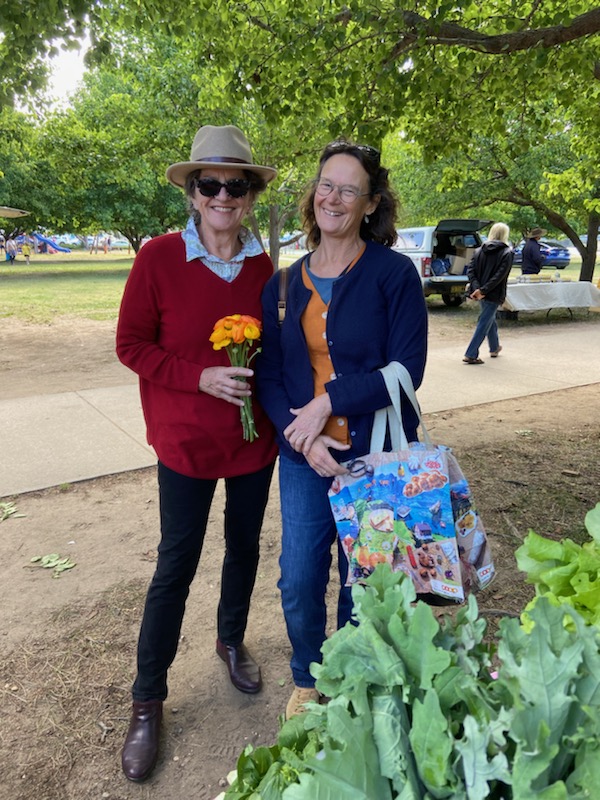By Shani Keane
Concern is mounting that new food safety regulations could put local vegetable growers out of business and bring about the end of the iconic SAGE Farmers Market in Moruya.
The NSW Food Authority recently released a draft of its new food regulations which will impact all vegetable growers, dairies, and egg, meat and seafood producers from February 2025.

Licences to grow lettuce
Under the proposals, all vegetable farmers, including small-scale market gardeners, will need to be licensed and have their operations inspected to grow and sell their products. Growers face a $370 per hour charge for food safety officers to educate skilled and experienced growers on the importance of maintaining food safety standards.
The Food Authority’s regulations apply the Australia New Zealand Food Standards Code. The new draft regulations cover all lettuces, spinach, kale, Asian leafy greens, herbs, spring onions, silverbeet, cabbage, microgreens and any other “leafy vegetable” that can be eaten raw.
SAGE Farmers Market manager Tanya Senior said growers and customers have expressed deep concern about the proposed regulatory changes, the lack of meaningful consultation, and the timing of the changes during the busiest part of their growing season.
“If small-scale growers are swept up thoughtlessly in these changes, then the costs of compliance could make their businesses unviable,” said Ms Senior, whose Left Field Farm will be impacted by the regulations.
“The NSW Food Authority’s draft proposals don’t seem to match the original intent of the federal government’s food standards which were supposed to be applied appropriately for small-scale growers because of the lower risks associated with direct selling of fresh produce.
“These leafy greens are the backbone of our growers’ operations. They produce the best income for small-scale farmers and fill their tables every Tuesday at the market. Because customers have a direct relationship with the growers, they have confidence they are buying good quality and safe produce. We already follow the health and safety requirements of the Australian New Zealand Food Standards Code.”
The original intent of the code was to apply the standards appropriately by taking a risk and size-based approach, Ms Senior said, adding that there is no evidence of food poisoning events associated with leafy greens grown by small-scale growers.
SAGE founding member Stuart Whitelaw has been consulting with local growers about their concerns.
“It’s complete government over-reach,” said Mr Whitelaw, who is a regular consumer of fresh market produce and has a long history of experience in restaurants and food preparation.

Direct sold vegetables carry less risk
“The realities of small-scale producers seem to have been disregarded or overlooked in the drafting of these regulations. Our growers pick their vegetables on the same day as they go to market locally, so the risks of food-borne illnesses are just not the same as those for massive farming operations with long supply chains.”
Mr Whitelaw said the demise of the not-for-profit SAGE Farmers Market because of ill-conceived government regulations would be a tragedy for the region.
“SAGE is a strong community organisation that has worked for 15 years to build a local food economy that is resilient in times of crisis, such as bushfires. SAGE’s members and regular market customers, including chefs, want continued access to nutritious, locally grown vegetables,” he said.
“Our region is well supplied for dairy and meat but has been lacking enough market gardeners to supply local demand for fresh produce.
“These regulations have the potential to undo all the years of hard work getting enough skilled growers operating in the local area. There is great local demand for the quality produce that comes from these growers.
“The SAGE Farmers Market is an essential element of the region’s economy. Our Tuesday market day brings many shoppers into Moruya which benefits many other local businesses.”
Expensive upgrades not viable
Veteran market gardener Fraser Bayley from Old Mill Road farm said a major concern for small scale growers is the Food Authority’s push for rinse water to be laboratory tested by approved facilities at regular intervals and sanitisers to be added to wash water.
“Setting up new systems to comply with the new regulations would be prohibitively expensive for small-scale growers and out of proportion to the health and safety benefits,” Mr Bayley said.
“Most of our produce is picked on the morning of the market and sold on the same day. We wash debris and soil from the produce in drinking quality water according to Food Safety rules to provide a clean, presentable and healthy product to consumers. We’ve done this for close to 20 years. Your grandparents and theirs did it for much longer.
“We certainly understand the need for leafy greens that are part of the centralised food distribution system to meet certain standards. But our produce has high traceability, a direct relationship between the grower and consumer and carries negligible risk.”
Proposals alarm loyal customers
Market customer Maja Schocher opposes any measures to force growers to chlorinate their wash water and said she would be devastated if she could not buy local fresh vegetables.
“It is the reason why I moved to the area. Having access to naturally grown produce is so important,” said Ms Schocher.
“It would be terrible if there was no farmers market. I’m totally happy with what I buy at the market and I’m grateful that people do this amazing work of growing healthy produce. It would be horrible if growers were forced to wash their vegetables in chlorinated water. I want to eat natural food that is washed in rain water.”
Growers are proposing that the NSW Food Authority create a third category of “micro” grower in the new regulations, for vegetable producers who grow on less than 2 hA. They are asking to be exempt from the following:
- Needing a licence to grow food for people
- Laboratory testing and associated costs for drinking quality water
- Unwarranted and unaffordable charges for inspections by Food Safety officers
- Government interference in a scale of the sector that has been providing healthy food the same way for thousands of years
Vegetable growers and advocates from the Australian Food Sovereignty Alliance will be at the next SAGE Farmers Market on Tuesday, December 10, encouraging customers to comment on the draft leafy vegetable regulations.
Readers can click on the links below to fill out the survey and find out more.

